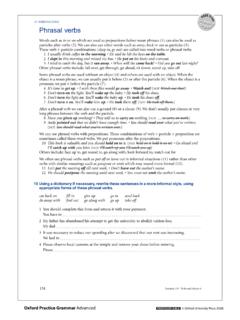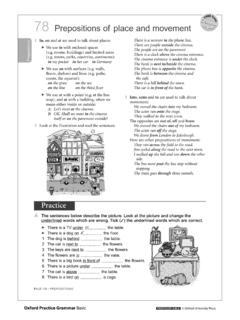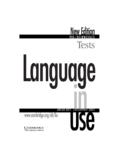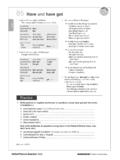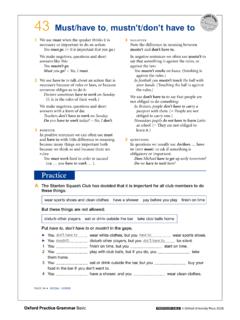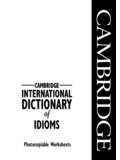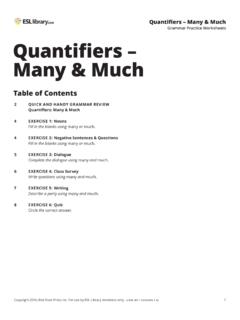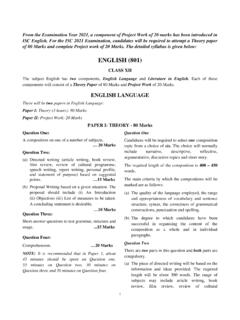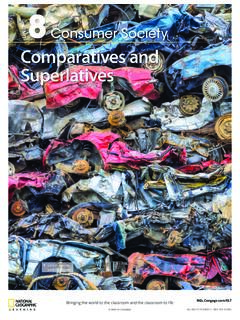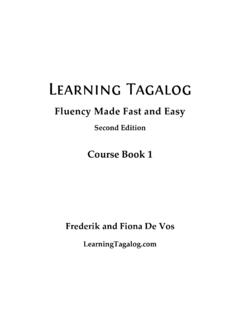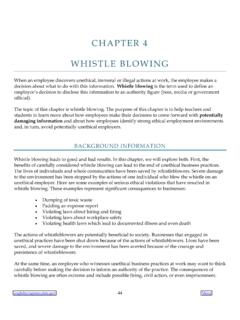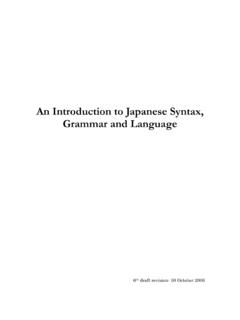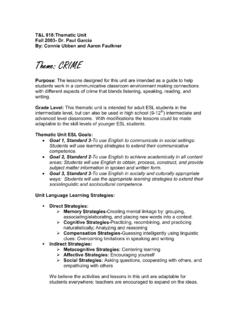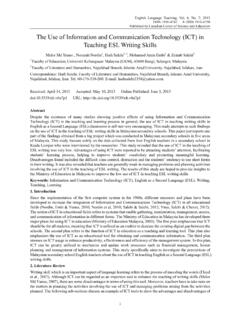Transcription of Grammar to go! Lesson Link
1 Lesson length: 60 minsAim: 1. to review the form and general use of the first conditional (talking about possible actions and situations in the future and their results) 2. to review and extend vocabulary for talking about a townPreparation: n You will need a copy of the following for each student/pair of students: Activity worksheet: What s my sentence? (Cut in half for Student A and Student B) Activity worksheet: Oxford Word Skills Unit 35 - I can talk about my town Handout: First conditional Activity worksheet: If you visit this city .. Grammar Review: n Write the following phrases on the board: start university stay with a friend get a job save money go on holiday n Ask students: Which of these might you do when you leave school? Tell them to talk to a partner and say why they might do these things.
2 Ask for feedback and encourage them to share any other ideas for things they might do. n Say aloud: If I pass my exams, I ll go to university. I ll go to university if I pass my exams. If I don t do well, I won t be able to go. I won t be able to go if I don t do well. n Ask students to repeat the phrases after you. n Ask: Are these sentences about the present or the future? [The future.] n Focus on the tenses by eliciting that the verb after if is in the present simple and the other verb is in the future (will/won t + infinitive). n Invite students to make and call out first conditional sentences of their own, thinking about the phrases for things they might do after university. Invite one or two to write their sentences on the board. n Then highlight the form again and clarify that this structure is often called first conditional.
3 N Remind the class that the clauses can be reversed, but without a comma. PhotocoPiabLe Oxford University Press 2010page 1 Lesson LinkGrammar to go!Unit 16 First conditional Oxford Living Grammar explains how Grammar works and when to use it. the exercises use real-life situations to practise Grammar in context . this Lesson consolidates your students knowledge of the first conditional with the opportunity to practise in the context of talking about their + subject + present simple + subject + will1. Review Activity n Distribute Handout: First Conditional to students. Students complete exercise A Possibilities in my future in pairs. Check the answers together as a class. n Divide the class into Student As and Student Bs. Give a copy of the Whats my sentence? Student A worksheet to each Student A, and a Student B worksheet to each Student B.
4 N Demonstrate the activity by writing on the board: If I make a lot of money, .. n On a piece of paper write the complete sentence, but don t show it to the class, If I make a lot of money, I ll buy a big house. n Invite the class to guess what the rest of your sentence is. Elicit several possible endings until someone offers the one you have written on the paper. n Focus on the worksheets and explain that half of each student s sentences have gaps, and their partner has the complete sentences. Students take turns trying to complete the sentences until they have said the exact sentence their partner has. Their partner can help and prompt if necessary. n Student A begins. Make sure that students say the complete sentence each time, and not just the missing words. Then Student B tries to complete their first sentence.
5 N Feed back as a Contextualized Activity (from review to free use ) n Speaking to the class: We are talking to a friend, and telling them about possible activities in our town. Ask them to call out (or jot down on paper) building and places in their town. Hand out Oxford Wordskills worksheet: TAsk InsTRuCTIons: A. Ask each pair to do the Oxford Word Skills exercises together. Correct them as a class. B. On Handout: First Conditional direct students to Grammar in Action 3. Ask everyone to read it (for a few minutes) and check that students have noted the use of may/might, should and the imperative for the result. C. Students complete If you visit this city on Activity Worksheet in pairs. Ask for volunteers for the answers. Check that all the vocabulary is known. D. Make groups of 4 to do the following exercise: Ask each group to decide on 1) a town/city; 2) what possible activities a visitor might do there; the advice they would give to the visitor.
6 E. Ask the groups to collect their ideas on paper and practise first conditional phrases. F. Decide who will start reading aloud the phrases for the class. Their friends in the group will take it in turns to add a phrase. The rest of the class has to see if they can guess the town/city. HoMEWoRk/EXPAnsIon Ask your students to read the rest of the Grammar in Action sections and then complete the OVER TO YOU practice section. PhotocoPiabLe Oxford University Press 2010page 2 Lesson LinkGrammar to go!PhotocoPiabLe Oxford University Press 2010page 3 Lesson LinkGrammar to go! EXTRA HELP Did your students remember the topic: form and main uses of the first conditional? (if not, revisit the presentation sections of Oxford Living Grammar Pre-intermediate Unit 16) Do your students need more practise?: Try exercise B on page 2 from the Downloadable Unit for more practice in typical contexts.
7 Have you got the right books to develop and extend vocabulary?: use units from Oxford Word Skills for I Oxford University Press 2010page 4 Lesson LinkGrammar to go!Activity worksheet: What s my sentence?student A 1 If you run, ..2 You ll be late for work if you don t get up If you need any help, ..4 If Michael starts jogging, he ll get We ll have a picnic ..6 You won t pass the exam if you don t I won t buy the watch ..8 If it rains tomorrow, we ll go to the B1 If you run, you ll catch the You ll be late for work ..3 If you need any help, call If Michael starts jogging, ..5 We ll have a picnic if it s You won t pass the exam ..7 I won t buy the watch if it s too If it rains tomorrow, ..!PhotocoPiabLe Oxford University Press 2010page 5 Lesson LinkGrammar to go!91 PLACES35 I can talk about my town Do Unit 34 firstA Buildings and places in a town castle palace statue square cathedral church temple ( for mosque(for Christians) (for Christians) Hindus and Buddhists) (for Muslims) market bridge park museumbuilding shop, church, castle NOT square, park, etc.
8 Correct the spelling museom cki[kc 4 catedral 1 brige 5 parque 2 scuare 6 musque 3 castel 7 bilding Complete the My sister got married in our little Y^khY^ .1 I think Buddhists use that .2 The is the best place to see the The is the cheapest place to buy You can learn about the history of the town in the local .5 You can see children playing in the from my hotel window. 6 There is a of Nelson Mandela in the main .7 The and are both open to visitors from 10 until The square is a nice to sit and watch people. Test yourself. Cover the words and name the things in the can use place as a general word for a town, part of a town, a hotel, is a nice place. The Ritz is a great place to OWS(B) U34-41 9129/11/07 15:04:07 PhotocoPiabLe Oxford University Press 2010page 6 Lesson LinkGrammar to go!]
9 Handout: First conditionalGrammar Presentation62 | Verb forms and structures1 Some examples of first conditional sentences:I ll phone you later if I have you leave now, you won t be late. 2 The first conditional pattern is: if + subject + present simple + subject + will If I pass my exams, I ll go to use a comma (,) after the if part of the sentence in this if clause can come second:I ll go to university if I pass my exams. We can use negative verbs in the same patterns:If I don t pass my exams, I won t go to university. I won t go to university if I fail my exams. We can form questions with all these patterns:What will you do if you don t pass your exams?Remember to use the present simple (NOT will/won t) after if in a first conditional sentence:If I pass .. (NOT if I will pass)If I don t pass .. (NOT if I won t pass) Grammar in action1 We use the first conditional to talk about possible actions and situations in the future, and the results of those actions and situations.
10 The if part of the sentence contains a possible action or situation, and the will/won t part of the sentence contains the result:If you run, you ll catch the bus. 2 We use the first conditional when we are talking about possibilities immediately after the present moment:You ll be late for work if you don t get up also use the first conditional when we are imagining and talking about possibilities a long time in the future. Here, a child imagines life as an adult: If I make a lot of money, I ll live in a big We can use may/might for the result, to say that the result is only possible, not certain: If I post this letter today, it might get there tomorrow. We can use should for the result, to say that the result is probable but not certain:If I post this letter today, they should get it before the end of the week. We can use an imperative for the result, to give an instruction or advice:Here s my card if you need any help, give me a ring.

